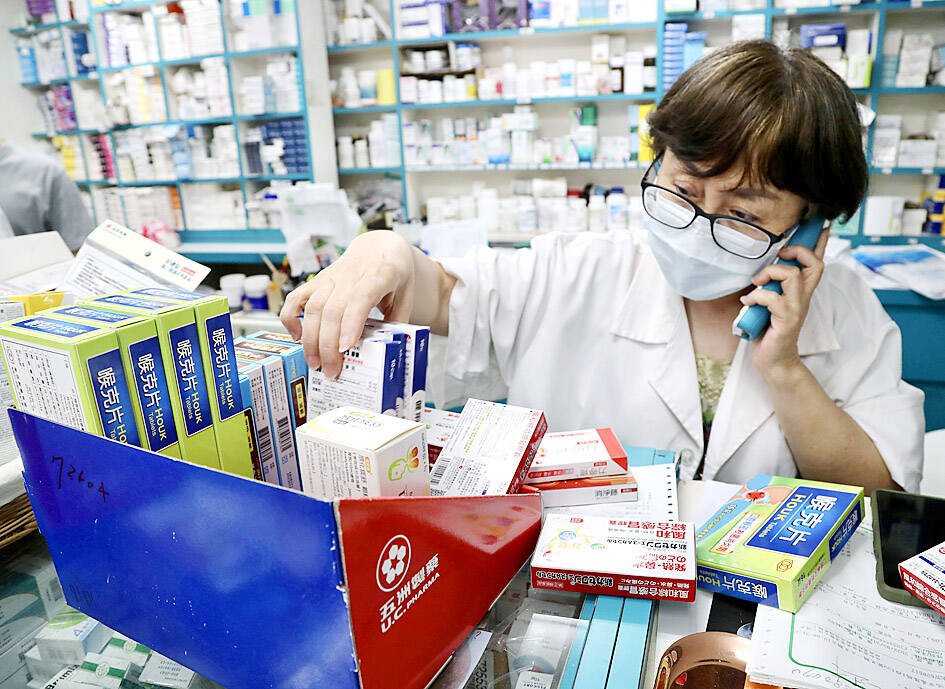The Taiwan Medical Association on Monday urged the Ministry of Health and Welfare not to suspend the National Health Insurance Administration’s (NHIA) drug expenditure target, but instead increase the National Health Insurance (NHI) budget and review spending on medicine to resolve a drug shortage.
The ministry on Monday announced that it would seek to address a shortage of dozens of drugs in the nation by guaranteeing that the prices of drugs in short supply would not be adjusted in the next drug expenditure target, to be implemented on April 1.
The mechanism sets a target value for the NHIA’s annual drug expenditure. If the spending exceeds the target value, the drug price would be adjusted in the next year using a formula to determine reasonable prices based on the NHIA’s reimbursement prices and market prices.

Photo: CNA
The ministry said it might re-evaluate the drug expenditure target mechanism as a long-term solution.
Abolishing that mechanism might harm the nation’s healthcare system, the Taiwan Medical Association said.
Taiwan’s healthcare system is well-known for providing high-quality healthcare “relatively cheap,” but the nation’s health expenditure — the share of health spending as GDP — is relatively low compared with many other advanced economies, it said.
The NHIA has been working hard to keep drug price adjustments stable and predictable under the drug expenditure target mechanism, but the COVID-19 pandemic, global economic issues and long holidays might still have contributed to temporary drug shortages, it said.
Abolishing the mechanism would cause drug prices to rise to unreasonable levels, and could affect the budget for other medical expenses, which would harm the nation’s overall healthcare system, the association said.
For the healthcare system to continue advancing, the long-term solution should be to reasonably increase the total NHI budget, but in the short term, the NHIA should discuss the mechanism and drug spending with the medical community before adjusting prices, it said.
The prices of many drugs of the same form, dosage and ingredients for treating the “three highs” — high blood pressure, blood lipids and blood sugar — have been cut to almost the lowest possible price, and if they are cut further, drug manufacturers might withdraw their products from the Taiwan market, it said.

The Ministry of Education (MOE) is to launch a new program to encourage international students to stay in Taiwan and explore job opportunities here after graduation, Deputy Minister of Education Yeh Ping-cheng (葉丙成) said on Friday. The government would provide full scholarships for international students to further their studies for two years in Taiwan, so those who want to pursue a master’s degree can consider applying for the program, he said. The fields included are science, technology, engineering, mathematics, semiconductors and finance, Yeh added. The program, called “Intense 2+2,” would also assist international students who completed the two years of further studies in

Former president Tsai Ing-wen (蔡英文) departed for Europe on Friday night, with planned stops in Lithuania and Denmark. Tsai arrived at Taiwan Taoyuan International Airport on Friday night, but did not speak to reporters before departing. Tsai wrote on social media later that the purpose of the trip was to reaffirm the commitment of Taiwanese to working with democratic allies to promote regional security and stability, upholding freedom and democracy, and defending their homeland. She also expressed hope that through joint efforts, Taiwan and Europe would continue to be partners building up economic resilience on the global stage. The former president was to first

Taiwan will now have four additional national holidays after the Legislative Yuan passed an amendment today, which also made Labor Day a national holiday for all sectors. The Chinese Nationalist Party (KMT) and Taiwan People’s Party (TPP) used their majority in the Legislative Yuan to pass the amendment to the Act on Implementing Memorial Days and State Holidays (紀念日及節日實施辦法), which the parties jointly proposed, in its third and final reading today. The legislature passed the bill to amend the act, which is currently enforced administratively, raising it to the legal level. The new legislation recognizes Confucius’ birthday on Sept. 28, the

MORE NEEDED: Recall drives against legislators in Miaoli’s two districts and Hsinchu’s second district were still a few thousand signatures short of the second-stage threshold Campaigners aiming to recall Chinese Nationalist Party (KMT) legislators yesterday said they expect success in 30 out of 35 districts where drives have passed the second-stage threshold, which would mark a record number of recall votes held at once. Hsinchu County recall campaigners yesterday announced that they reached the second-stage threshold in the recall effort against Legislator Lin Szu-ming (林思銘). A total of 26,414 signatures have been gathered over the past two months, surpassing the 10 percent threshold of 23,287 in Hsinchu County’s second electoral district, chief campaigner Hsieh Ting-ting (謝婷婷) said. “Our target is to gather an additional 1,500 signatures to reach